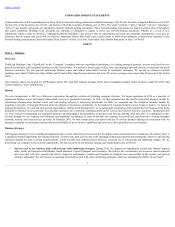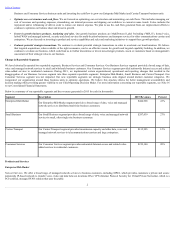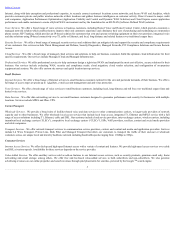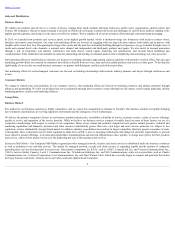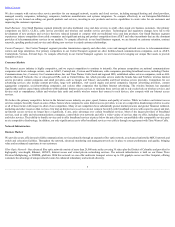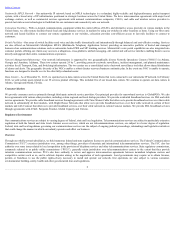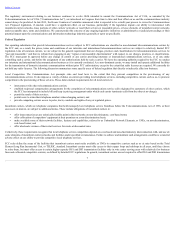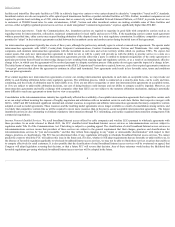Earthlink 2015 Annual Report Download - page 14
Download and view the complete annual report
Please find page 14 of the 2015 Earthlink annual report below. You can navigate through the pages in the report by either clicking on the pages listed below, or by using the keyword search tool below to find specific information within the annual report.
Table of Contents
Additional measures to protect CPNI and consumer privacy are proposed from time to time, and both Congress and the FCC currently are considering such
additional measures. These developments appear to be part of a broader trend to protect consumer information as it continues increasingly to be transmitted in
electronic formats. We cannot predict whether additional requirements governing CPNI or other consumer data will be enacted, or whether such additional
requirements will affect our ability to market or provide our services to current and future customers.
Forbearance. The Communications Act provides the FCC with the authority to not enforce, or “forbear” from enforcing, statutory requirements and regulations if
certain factors are satisfied. If the FCC were to forbear from enforcing regulations that have been established to enable competitors to offer broadband Internet
access and VoIP, our business could be adversely affected. In December 2005, the FCC granted, in part, a petition for forbearance filed by CenturyLink (formerly
Qwest) seeking relief from specified dominant carrier regulations, including some unbundling obligations related to high capacity loops and transport, in those
portions of the Omaha metropolitan statistical area where facilities-based competition had allegedly increased significantly. The FCC's dominant carrier regulations
require CenturyLink, in part, to offer UNEs and also serve as a check on dominant carrier pricing for other wholesale services, such as special access lines, that we
seek to purchase at commercially acceptable prices. Since being granted relief by the FCC, CenturyLink has substantially increased the prices for the network
elements that we use to provide services in eight central offices in the Omaha metropolitan statistical area.
Since 2007, the FCC has denied a series of petitions by CenturyLink and Verizon seeking similar forbearance from unbundling requirements in particular
metropolitan areas. However, the FCC has granted a series of petitions forbearing from dominant carrier regulation for most incumbent LECs’ enterprise
broadband services, such as Ethernet. Most recently, in a June 2010 order denying a CenturyLink petition for forbearance from unbundling requirements in
Phoenix, the FCC set forth specific thresholds and analytical frameworks that must be met for grant of such petitions. That FCC decision was affirmed by a court of
appeals. The FCC is currently reviewing a petition filed by CenturyLink seeking forbearance from dominant carrier regulation of certain of its subsidiaries’
enterprise broadband services, as well as a petition filed by USTelecom seeking forbearance from a range of incumbent LEC regulatory obligations (including
restrictions on the provision of special access services via contract tariff and the requirement to offer competitors access to newly deployed conduit at regulated
rates). If the FCC grants these or similar forbearance petitions filed by incumbent carriers in the future affecting markets in which we operate, our costs could
increase and, thus, our ability to achieve our target profit margins in those markets could be materially adversely affected. The grant of these petitions also would
enable incumbent carriers to compete with their competitors, including us, more aggressively on price in the affected markets.
Other Federal Regulation. In addition to the specific matters listed above, we are subject to a variety of other FCC filing, reporting, record-keeping and fee
payment requirements. The FCC has the authority generally to condition, modify, cancel, terminate, revoke or decline to renew licenses and operating authority for
failure to comply with federal laws and the FCC's rules, regulations and policies. Fines or other penalties also may be imposed for such violations. The FCC or
third parties may raise issues with regard to our compliance with applicable laws and regulations. Moreover, we are subject to additional federal regulation and
compliance requirements from other government agencies such as the Federal Trade Commission, the Internal Revenue Service and the Securities and Exchange
Commission.
State Regulation
We are subject to various state laws and regulations. Most state PUCs require providers such as us to obtain certificates of authority from the commission before
offering communications services between points within the state. We may also be required to file tariffs or price lists setting forth the terms, conditions and prices
for specified services that are classified as intrastate and to update or amend our tariffs when we adjust our rates or add new products. We also are subject to
various reporting and record-keeping requirements and contribute to state USF, E911 and other funds, and collect and/or pay other taxes, fees and surcharges where
applicable. Certificates of authority can be conditioned, modified, canceled, terminated or revoked by state regulatory authorities for a carrier's failure to comply
with state laws or rules, regulations and policies of state regulatory authorities. State utility commissions generally have authority to supervise telecommunications
service providers in their states and to enforce state utility laws and regulations. Fines or other penalties also may be imposed for violations. PUCs or third parties
may raise issues with regard to our compliance with applicable laws or regulations.
Through certain of our operating subsidiaries, we have authority to offer intrastate long distance services in all 50 U.S. states, and have authority to offer local
telephone services in all 50 U.S. states and the District of Columbia. We provide local services, where authorized, by reselling the retail local services of the
incumbent carrier in a given territory and, in some established markets, by using incumbent carriers' network elements and our own local switching facilities.
State PUCs have responsibility under the Communications Act to oversee relationships between incumbent carriers and their competitors with respect to such
competitors' use of the incumbent carriers' network elements and wholesale local services. PUCs
11


